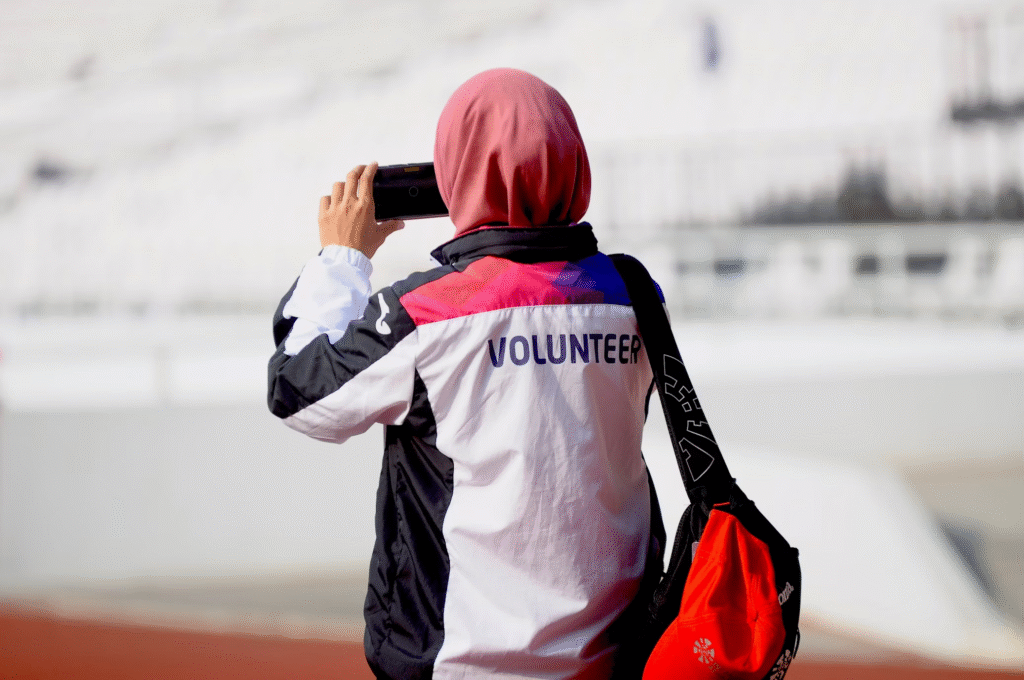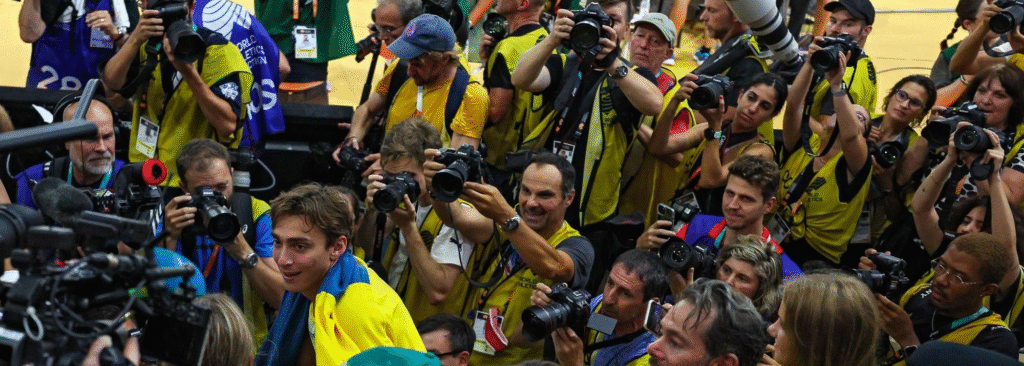The World Athletics Championships are about more than just medals and world records. Behind every lane, jump, and throw are the people making it all possible, from event coordinators and operations staff to media officers and team liaisons. This is what we call The Playmakers’ Guide: the unsung ecosystem that turns sport into spectacle.
Setting the Stage: The Engine Behind the Championships

This year’s World Championships in Tokyo have drawn more than 2,000 athletes from over 190 countries. But for months, and in some cases years, the Japanese Athletics Federation, World Athletics event planners, and hundreds of volunteers have worked to deliver a competition that balances performance with precision.
Event Director Yuko Nakamura has been instrumental in overseeing logistics across venues, managing the coordination of security, transport, athlete zones, and media access. Working closely with World Athletics’ Competition Department, she leads a team of over 200 people.
As the world’s eyes turn to the 2025 Championships, much of the focus naturally falls on the incredible athletes competing for gold. Yet behind every race, jump, and throw, there is a dedicated team of leaders, coaches, medical experts, and organisers whose work makes the spectacle possible.
Understanding their stories and contributions offers a richer picture of what it takes to stage one of the world’s premier sporting events.
Jon Ridgeon: Leadership from Athlete to Executive
Jon Ridgeon’s journey in athletics began on the track, where he competed as a 110m hurdler representing Great Britain. He was a silver medallist at the World Championships and competed in multiple Olympic Games. After retiring from competition, Ridgeon transitioned into sports broadcasting and business before stepping into executive leadership. He now serves as the CEO of World Athletics.
His firsthand experience as an elite athlete gives him a unique perspective on the sport’s challenges and opportunities. Ridgeon has made it a priority to globalise athletics, support the development of emerging nations, and amplify voices from underrepresented groups.
Under his leadership, World Athletics has enhanced fan engagement through digital innovation and media partnerships. Importantly, he’s advocated for a more athlete-centred approach to governance, balancing commercial growth with well-being, fair scheduling, and sustainable careers for competitors.
Glen Mills: Coaching Jamaica’s Sprint Legacy
Few coaches have shaped modern sprinting like Glen Mills. As the long-time coach of Usain Bolt, Yohan Blake, and other Jamaican sprint stars, Mills’ influence has extended well beyond the island. His career began in the 1970s, and he has since become a cornerstone of Jamaica’s global sprint dominance.
His training philosophy is a blend of meticulous biomechanics, mental resilience, and cultural grounding. Rather than pushing athletes to their limit year-round, Mills tailors their progress carefully, a key factor in Bolt’s sustained supremacy over multiple Olympic cycles.
At the 2025 Championships, Jamaica’s sprint contingent continues to lean on Mills’ experience. His athletes are among the favourites, and his coaching legacy is visible even in competitors from other nations who emulate his model.
Dr. Louise Kilding: Athlete Health and Recovery
In the high-stakes world of elite athletics, injury prevention and recovery can make or break careers. Dr. Louise Kilding, a leading sports physiologist and researcher based in the UK, works with both national teams and individual elite athletes, ensuring they arrive at major championships healthy, resilient, and ready.
Her work spans metabolic analysis, injury tracking, hydration strategies, and psychological recovery, with a particular focus on female athlete health, an area often under-researched in high-performance sport. Kilding also advises athletics federations on policy related to safe training loads and return-to-play protocols.
Her integration of data-led science with hands-on care allows for sustainable performance, not just peak moments, but long careers. Kilding’s behind-the-scenes role highlights the intricate web of support necessary for elite competition.
Mari Tanaka: Organising the Championships
Mari Tanaka, the local event director for the 2025 Championships, is the logistical brain behind everything spectators don’t see, and everything athletes depend on. From venue readiness and athlete transport to coordinating with broadcasters, medical teams, and national delegations, her oversight is pivotal.
Previously involved in Tokyo 2020 and several Diamond League meets, Tanaka has earned a reputation for cool-headed execution and athlete-first planning. This year, she’s also spearheading new sustainability practices, including eco-friendly infrastructure and local transport solutions.
Her experience navigating the complexities of global competition in a post-pandemic world has made her one of the sport’s most respected operations leaders.
Emanuela Di Centa: Athlete Representation in Governance
Emanuela Di Centa, a former Olympic cross-country skier for Italy, is now one of the most influential athlete advocates in international sport governance. As a member of World Athletics’ Council, Di Centa focuses on policies that directly affect athletes, from mental health resources to safeguarding and post-retirement support.
Her sporting background includes multiple Olympic medals and a long career shaped by perseverance. She now channels that insight into building better systems for athletes navigating both peak years and transition periods.
Thanks to her efforts, athlete voices are no longer an afterthought in major decisions, but central to the way the sport is shaped and governed.
Broadcasters, Timers, and Data Partners
Accurate, instant performance tracking is essential to modern athletics. Timing at the Championships is powered by Seiko, who have partnered with World Athletics for decades. Their systems combine lasers, transponders, and AI cameras to track every movement with millisecond precision.
Meanwhile, broadcasters including the BBC, NBC, and NHK partner with World Athletics to deliver live stats, athlete insights, and slow-motion analysis to millions of fans around the world. The Championships are a global media event, and the technology behind the scenes ensures the stories are told in real-time.
Volunteer Voices: Powering the Atmosphere

Over 800 local volunteers are supporting the Championships, from language interpreters and transport marshals to hydration crew and social media assistants.
Volunteers are often the human face of the competition, offering warmth, precision, and local culture to one of the world’s most international sporting events.
Spotlight Performers and Ones to Watch

As the Championship heads into its final weekend, several standout athletes are dominating headlines:
- Rhasidat Adeleke (Ireland): Fresh off a string of Diamond League victories, Adeleke continues her rise after medaling at the European Championships. Her versatility across 200m and 400m makes her one of the meet’s most exciting young stars.
- Noah Lyles (USA): With a dominant 200m season behind him, Lyles is chasing the sprint double, aiming to repeat his 100m/200m gold performance and cement his status as the world’s fastest man.
- Mondo Duplantis (Sweden): Already a world record holder in the pole vault, Duplantis continues to push the boundaries of what’s possible in the event. Tokyo could mark yet another bar cleared in his legendary career.
Team standings currently see the USA, Jamaica, and Kenya at the top of the medal table, with Great Britain closing in on a top-five finish.
Getting Involved

If you’re inspired by the people behind the action, there are many ways to be part of the ecosystem that powers global sport.
- 🌍 Get involved with World Athletics
- 🏃 Volunteer at athletics events
- 🎓 Explore careers in sport management or operations
Whether you’re laying tape, writing athlete bios, or coordinating transport, events like the World Championships don’t happen without you.
The Playmakers’ Guide is part of Service Break’s ongoing series celebrating the people shaping sport from behind the scenes. Because getting ahead isn’t just about the athletes, it’s about the people who make the athletes possible.
#ThisIsServiceBreak


